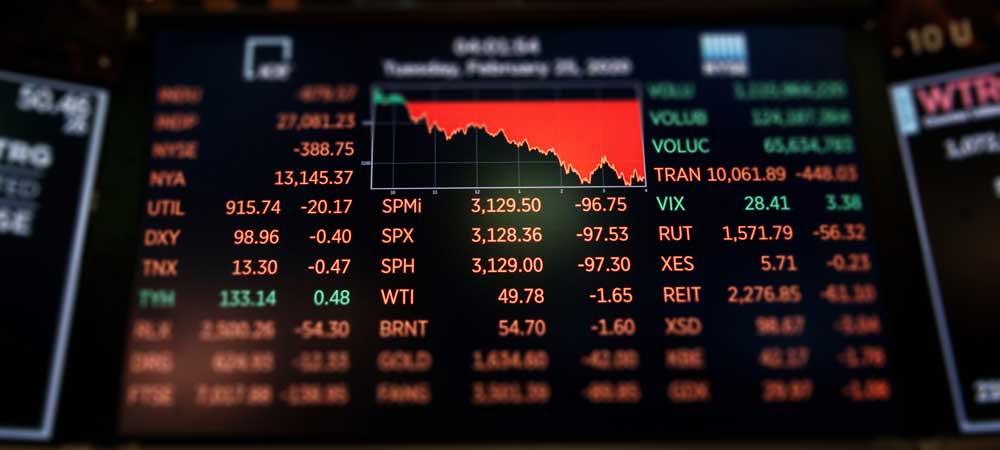- Changing industry standards have caused stock prices for European gaming affiliates to plummet.
- Top betting affiliates in the UK saw their share price drop by 70% from 2018 to 2020.
- The American sports betting market has seen little effect so far, but that could change.
LONDON – From February 2018 to January 2020, the top five publicly traded gambling affiliate companies in Europe lost a combined 70% in stock value. The decrease in stock value comes during a time when European countries are considering harsh new restrictions on the gambling industry.
XLMedia, formerly the most valuable publicly traded gambling affiliate on the European stock market, has seen its share price decrease from $187.50 in 2018 to $46.50 in January 2020—a drop of 75.2%. In January 2020 alone, its share value decreased by $16.50 (26.2%).
January was notable for European gambling operators as the UK government announced that it was discussing the idea of banning jersey sponsorships for professional soccer teams. There are 25 of 44 teams in England’s top two soccer divisions that have gambling companies as their primary shirt sponsor.
Many gaming companies have voluntarily dropped their television advertising entirely, and one sports betting firm, GVC Holdings PLC, dropped all of its soccer sponsorships, citing concerns about an oversaturation of gaming marketing.
Elsewhere, in Spain, the government just announced a plan to reduce gambling advertising by 80% throughout the country as part of an initiative to combat problem gaming habits.
Spain’s measure would not ban jersey sponsorship, but it would disallow any gambling advertisement via television or radio prior to 8 p.m. and advertisements for online gambling prior to 1 a.m. These time frames cover the broadcast window for the majority of La Liga matches.
Additionally, it would ban celebrity sponsorship of gambling companies and mandate the removal of gambling shirt sponsors from children’s apparel.
Gaming companies have also been experiencing challenges with Google’s constantly shifting algorithms for ranking websites. The decreased visibility cost XLMedia 29.4% in share value, according to a statement from company executives in the beginning of February 2020.
Potential Impact On U.S. Sports Betting
The steep decline in value of European sports gambling has coincided with record revenues for the nascent American sports betting market.
On paper, the U.S. market appears to be situated in a more stable position as well. Unlike their European counterparts, American gaming companies do not rely heavily on jersey sponsorships or ubiquitous advertising, so regulatory changes like those in England and Spain would likely have less effect.
That isn’t to say that American gaming companies don’t advertise at all, as any NFL fan who can recite DraftKings and FanDuel ads from memory will attest. But terms like “gambling” and “betting” have had a negative connotation in the U.S. for so long that companies are hesitant to commit to huge ad campaigns.
The one issue that could cross the Atlantic and harm American sportsbooks is Google’s search algorithm. Most companies rely on web traffic to maximize their consumer base, so any slight tweaks to the top search engine in the world can have disastrous consequences.
States with legal sports betting can use Google Ads to advertise sports betting sites. Google has been more lenient in those states and it is expected that trend will continue into more states as they are considering legalizing the activity as well.
The American sports betting industry is still projected to grow for the foreseeable future, but it would behoove gaming companies to monitor for these kinds of earthshaking regulatory changes.
Advertising Disclosure
In order to provide you with the best independent sports betting news and content LegalSportsBetting.com may receive a commission from partners when you make a purchase through a link on our site.
News tags: England | Google | La Liga | Premier League | Spain | United Kingdom | XLMedia

With a dual background in English and sports performance and business analytics, Carter aims to write stories that both engage and inform the reader. He prides himself on his ability to interweave empirical data and traditional narrative storytelling. When he isn’t keeping readers up to date on the latest sports betting legal news, he’s banging his head against a wall regretting his decision to be a Tampa Bay Buccaneers fan.


 Bitcoin Sports Betting Sites
Bitcoin Sports Betting Sites Best Online Sports Betting
Best Online Sports Betting Famous Sports Bettors
Famous Sports Bettors States With Legal Sports Betting
States With Legal Sports Betting Sports Betting Events
Sports Betting Events




